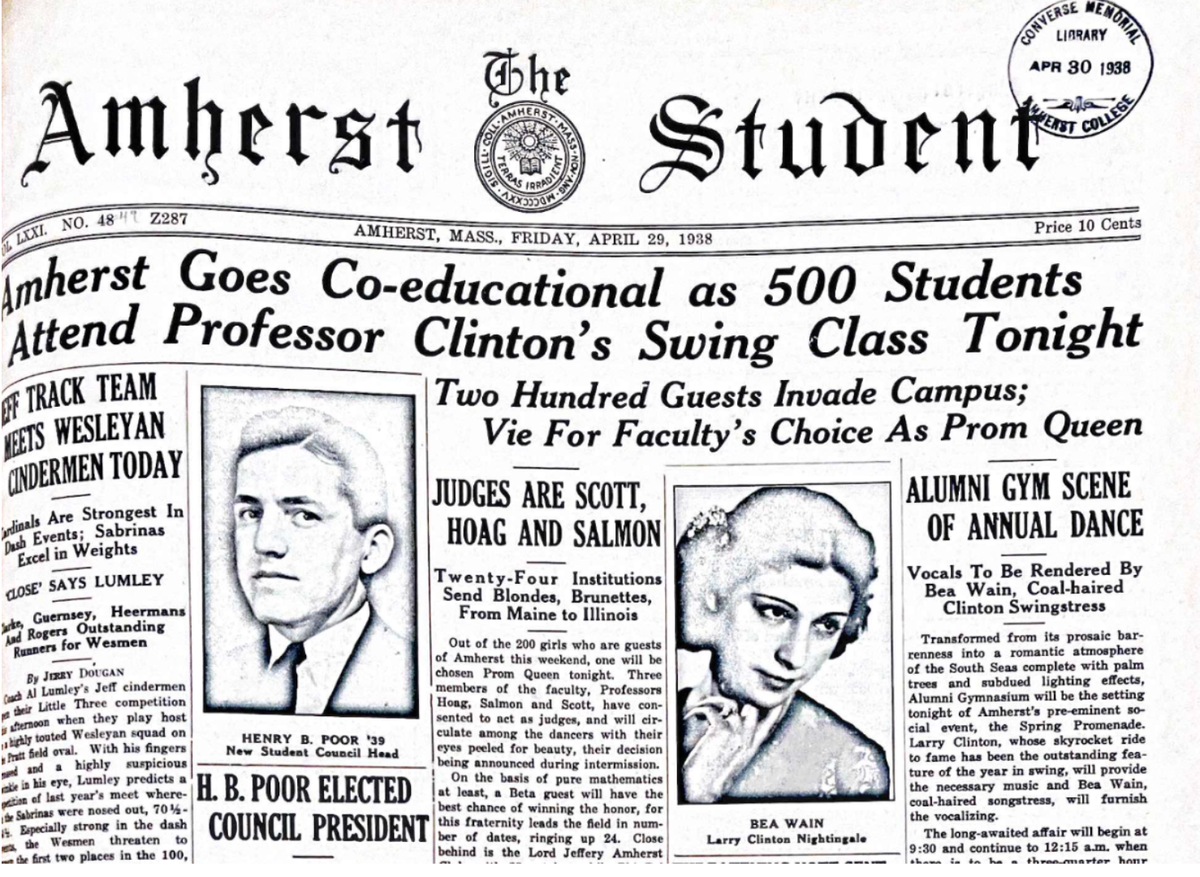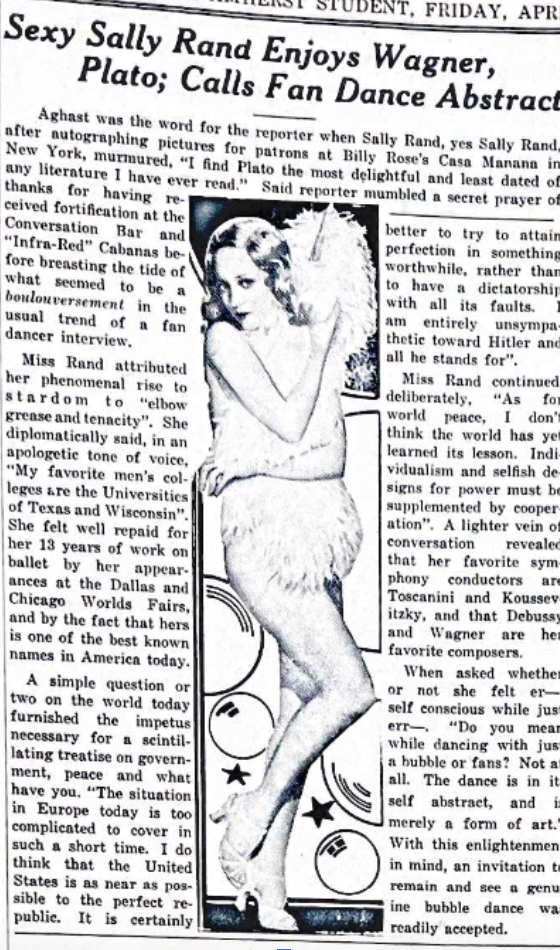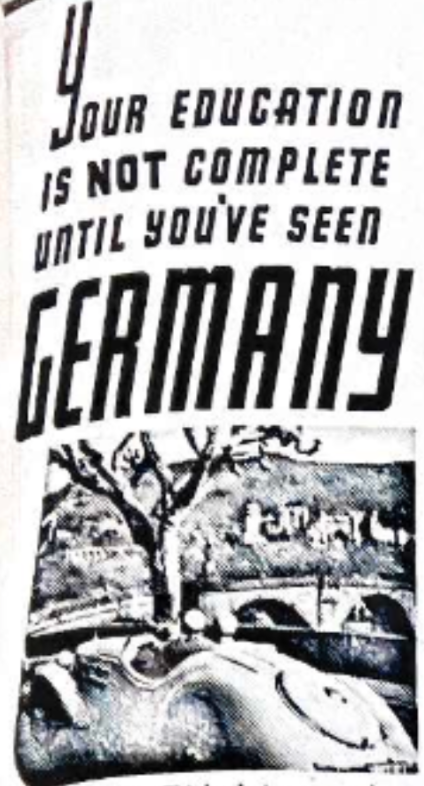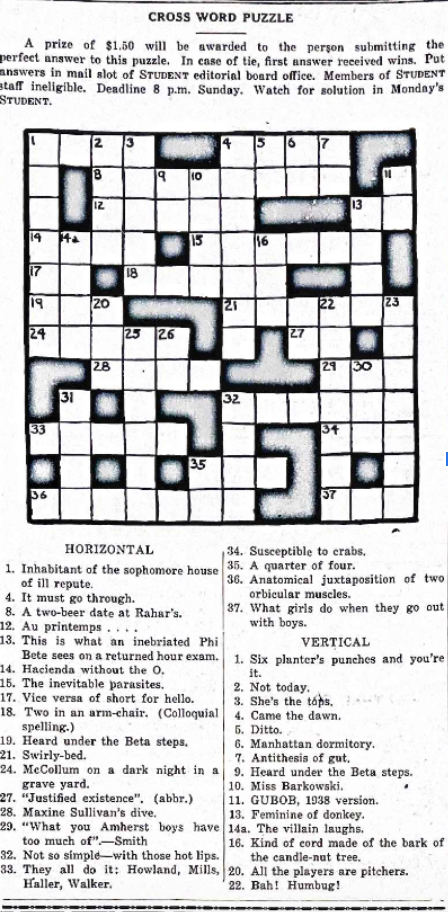Old News: This Week in 1938
In her final edition of Old News, Senior Managing Editor Sonia Chajet Wides ’25 explores the April 29, 1938 edition of the Student, filled with stories about Spring Prom, unbelievable pranks, and the threat of an impending World War.

Welcome back to Old News! In this column, I use a random number generator to select a year in the college’s history and take a look at The Student’s issue from this week in that year. Read more about this project in my first column here.
This Week’s Year: 1938
This week’s Old News brings us to Amherst on April 29, 1938, in a 25-page long edition of The Student — which I have to say might be the craziest issue of the paper I have read yet. The Student’s main concern was the upcoming Spring Prom, which featured a famous swing band and a full calendar of events. The pages were populated with excited chatter about tropical decorations, copious references to alcohol, and endless prom-related advertisements. But there was a dark side to the prom coverage, with sexist descriptions of visiting dates and a creepy Prom Queen contest judged by Amherst professors. The lewd references were threaded throughout, a continuous reminder of “old Amherst” days, in which the college was explicitly dedicated to furnishing a new generation of white male elites — and bonding them with their professors through chauvinistic interactions with women.
The Student was also filled with cryptic references to impending war, the rise of Adolf Hitler in Germany, and the policies of Imperial Japan. It is a view of the college on the eve of World War II, where pacifist meetings and anti-Axis statements mingled with ads for Nazi-accented German tourism and a letter from Doshisha University faculty defending the Japanese government.
Aside from these topics, this issue of The Student was rife with stories that I didn’t quite know if I should believe: a nearby mayor proposes putting college drunks in a lion’s cage, fraternities keep a cow on the Amherst Town Common as an anti-police protest, The Student interviews an actress and a burlesque dancer in their dressing rooms. I did my best to verify some of these stories or point out their holes, but at least for now, my results are inconclusive, and it’s up to you how much their veracity matters anyway.
This Old News is also significant because it is my last one. Over the course of the last three years, I’ve explored 15 snapshots of years in the college’s history. I have learned so much about the stories that echo on this campus, and have seen how the tides of change within and around the college shaped it. I have also gotten to think about the role The Student plays in capturing these moments — since I began the column, I have edited and written articles for The Student with the awareness that the issues we put out will live in the archives as part of the patchwork that tells people what it was like to be at Amherst right now.
Old News isn’t over — there are some very capable students who will pick up the mantle — but I want to express my gratitude and say just how fun it has been to write these. Thank you for reading them.
Spring Prom
The night of Friday, April 29 was Amherst’s annual Spring Prom. Students were set to gather in an Alumni Gymnasium “transformed from its prosaic barrenness into a romantic atmosphere of the South Seas” with cellophane palm trees and orchids from 9:30 p.m. until 3 a.m. Music was provided by famed bandleader Larry Clinton and “coal-haired songstress” Bea Wain — the two were the first to record and release “Heart and Soul.” The weekend was supplemented with a “Swimming Carnival” featuring synchronized swimmers from Smith and other “champion and comic diving.”
As part of these events, 200 women were to arrive on campus as dates for Amherst men. Most of these “damsels” came from Smith and Mount Holyoke, but some traveled from Chicago, Virginia, and Maine. The Student’s coverage contained extensive and frankly disturbing comments about these women.
“Twenty-Four Institutions Send Blondes, Brunettes, From Maine to Illinois,” the front page boasted, and announced that the dates would compete for the title of “Prom Queen” — to be judged by three Amherst faculty members, including legendary Winkley Professor of History E. Dwight Salmon. It was difficult for me to read about the contest, the professors “circulat[ing] among the dancers with their eyes peeled for beauty,” and the rumors that “Professor Scott prefers blondes, while Professors Hoag and Salmon are prejudiced in favor of brunettes.” There was also fierce competition among the Amherst fraternities over which group “led the field in number of dates.” This Prom Queen contest, and many of the other comments about the dates, were a stark reminder of an Amherst culture where male students bonded with their professors over their taste in nineteen-year-old women, who served as mere accessories.
A variety of other articles buzzed about the prom, many of them imbued with this gendered commentary. One triptych of poems by Graham Rudd poked fun at prom dates: “Your eyes are dark, the lashes curl, thy glamorous face / Does beckon willing slaves up to your earthly casement. / Nymph of night, madonna with the moon beam’s grace, / (We know damn well you bought the stuff in Macy’s basement).”
Other pages were filled with a ton of ads catered to the prom-going students. There was one ad for prom itself, blaring the words “Beauty. Grass. Beer. Party.” There were ads for photographed portraits at the dance; classy pre-prom dinners to “promote yourself” for dates; “early morning breakfast” at 3:30 a.m. (wheat cakes and sausage for 75 cents); and the Morgan Music Library offering 14 Larry Clinton songs for $4.50 “to keep swinging after the prom.” Some businesses got a little more creative: “After you SWING INTO THE PROM, SWING THROUGH those Final Term Papers with a Remington Noiseless Typewriter.”
One of the most enlightening articles was an interview with Amherst Police Chief John Trainor, who indicated to The Student that “prom drunks will be let alone” because “they are only young once” — as long as “it isn’t a regular occurrence ... After all, a party wouldn’t be much without some drinking,” Trainor said.
A “Lion’s Cage for College Drunks” and other unlikely stories
John Trainor’s approach to drunk young men was very different from that of another public figure interviewed in this week’s Student: Mayor William E. Kane of Woburn, Massachusetts. The article about Kane was one among many that gave me pause — it was difficult to tell what was true and what was a joke. At first, I thought the article declaring that Kane was “the man who has revolutionized justice by placing the town drunks in a lion’s cage that is hauled through the streets of the bustling city” had to be a joke. But I found that the article’s premise was true — there really was a Mayor William E. Kane of Woburn who created a plan to “parade drunks in a lion’s cage, as a temperance move.” The policy was widely reported, but Kane ended up backing down due to legal challenges (go figure). He later instituted a policy of turning off all streetlights on nights of a full moon to save energy. The Student article said that an Amherst reporter had asked Kane if the cage would work in a college town, to which Kane replied: “Don’tcha see, it would work anywhere!” It’s unclear to me if this conversation actually happened, or if The Student was just playing off a sensational news story — but regardless, the basis of the joke was true.
Another article I took a closer look at was a report that Dan Wickenden ’35 was publishing a short story titled “Angela Was a Hussy” in Good Housekeeping’s May issue. The story was “the tale of a tom-boy girl of sixteen who steals a suitor away from her by means of a rather simple plot.” Wickenden did indeed go on to become a well-known author, but I thought this short story title could have been a joke. Wrong: “Angela Was a Hussy” really did appear in the next month’s issue of Good Housekeeping.
Another factually ambiguous story reported that members of two frats were engaged in a revenge scheme against the aforementioned Chief of Police John Trainor, who had recently gotten them in trouble “for innocent ball throwing.” Their plan was to buy or rent a cow from a local farmer, which they would then tether on the common opposite the Lord Jeffery Inn (now the Inn on Boltwood). Another aspect of the plan consisted of picking on Trainor’s frequent swearing when frustrated by college students — “It appears that the legal experts of the campus have unearthed an old law to the effect that swearing on the streets by Amherst citizens is a jailable offense.”
More interviews
There were a number of interviews with prominent people published in this week’s Student: New York Governor Herbert Lehman, New York Herald Tribune Sports Editor Stanley Woodward, New York City Police Commissioner Lewis Valentine, and more.
There was a supposed interview with famous actress Frances Farmer, conducted “between applications of cold cream” backstage at the Belasco Theater in Manhattan. All the information in Farmer’s interview seems accurate, although it is hard to imagine that a Student reporter was granted access to her dressing room. Maybe I’m just not dreaming big enough.
In any case, The Student published an article on another famous female performer, Sally Rand, a burlesque dancer famous for her revealing “bubble dances.” This interview seems to me to be blatantly fake, poking fun at Rand and her profession. “Sexy Sally Rand Enjoys Wagner, Plato,” the headline said, before relaying that The Student’s reporter was “aghast” at Rand’s enlightened commentary on “the situation in Europe” and her favorite composers. “When asked whether or not she felt er—, self conscious while just err—. ‘Do you mean while dancing with just a bubble or fans? Not at all. The dance is in itself abstract, and is merely a form of art,’” the article said.
Again, it is possible that a Student reporter really did sit down and chat with Sally Rand, and that this quote is accurate. But based on the way that women were discussed elsewhere in this issue, I suspect it was more likely that this reporter was just making fun of Rand.

National politics
This edition of The Student was published toward the tail end of the New Deal’s implementation. One article mentioned that a cross-fraternity committee sought exemption from new Social Security taxes, which The Student reported were already costing them $5,100. “The house treasurers feel that the tax is unjust because it is levied on students who are supposed to be exempt,” The Student reported.
The Student’s tone did not indicate that the struggles of the Great Depression were felt on campus, but there were references to President Franklin Roosevelt. One article covered a recent speech by alum Bruce Barton 1907, an anti-Roosevelt Republican congressman who “flayed the present administration” for its economic policies (“You can’t run a country and kick businessmen in the face”) and for the Reorganization Bill of 1939. “Some features of [the bill] are good,” Barton said, “But the situation is complicated by the fact that the … country has been shocked by actions like attempts to pack the Supreme Court.” Reading Barton’s words, I was reminded of the 1932 Student I read for Election Day, in which Roosevelt lost the Amherst vote despite winning the national election.
Other references to changing times were less overtly political, but interesting nonetheless. N.A. Kellogg, a longtime town taxi driver, was interviewed about chauffeuring four college presidents and shuttling “Sabrina in all her scurrying glory.” Kellogg noted that the Sabrina-focused class feuds had waned, and student car ownership had gone up, such that his business was not “worth even whispering about now.” Kellogg’s memories also included driving drunk students home from Holyoke in the days when there were no beer-licensed businesses in Amherst — he described dragging one inebriated student from Converse to his bed in Pratt Dormitory.
The specter of war
Amidst all the cheerful prom chatter and endless ginger ale advertisements, it was eerie to read scattered foreshadowing of the looming world war.
For one thing, The Student covered a Johnson Chapel meeting organized by the Amherst Peace Council. The meeting was held at the same time as similar ones at colleges across the country, like Cornell, Vassar, Barnard, and Columbia, and produced a four-pronged program to promote pacifism. The students said they would vote on the Peace Council’s program and send the results to the White House.
At the meeting, another professor, Walter Kotschnig of Smith, called “the Rome-Berlin axis … the ‘Hitler-Mussolini Wrecking Company, Unlimited’” and said “we are now closer to the abyss of war than we ever have been, without the actual declaration of hostilities.” Kotschnig would later become a prominent diplomat for the U.S. State Department and help to establish the United Nations.
The Student noted that Kotschnig had arrived in the United States from Austria only 18 months prior, but failed to mention that he had lost his Austrian citizenship following the March 12, 1938 Anschluss, when Nazi Germany annexed Austria. It was, of course, another omen of Hitler’s growing power in Europe, and was not a universally popular move among Austrians — as anyone who has watched “The Sound of Music” is well aware.
But in that same edition of The Student, a large ad for German tourism included an altogether romantic line about the Anschluss. Encouraging Amherst students to visit the country (“Your education is NOT complete until you’ve seen Germany”), the German Railroads Information Office wrote extensively of tourist sites, including “romantic Vienna, living in waltz time and happily reunited with Germany.” The ad tried to lure students with “healthy, interesting hiking or biking … from one Youth Hostel to the next” — the German Youth Hostel Association had merged into the Hitler Youth five years beforehand, in 1933.

On the Pacific front, The Student published conflicting opinions about Japan’s imperial regime and its already-raging war against China. There was one article featuring extensive quotes from Chinese Ambassador Chengting T. Wang (spelled incorrectly as Ambassador Wong in The Student), who espoused the virtues of Chinese foreign policy and heaped praise upon “nice” Japanese people while warning about “the conscienceless military regime, which will eventually lead to Japan’s downfall.”
An article on the same page, though, featured a recent letter from 53 faculty of Doshisha University in Japan, a longtime partner of the college. The Amherst-Doshisha partnership was later “interrupted by the war,” but at this point, Amherst faculty received the letter from Doshisha professors “explaining the Sino-Japanese question as they see it” and “defending” Japanese foreign policy aims. The Doshisha faculty argued that “China lacks the qualities of a nation” and justified the Manchurian Incident (a pretext for Japan’s invasion), saying “that Japanese rights had been established there at the end of the Russo-Japanese War.” They also claimed that there was a Chinese policy of “inculcating hatred of the Japanese in school children” and warned against a Chinese “alliance with Soviet Russia.”
This week’s Old News transported me to the haunting brink of war. Many of the students quoted in this edition of the paper would soon meet their fates on the battlefields of World War II.
A member of Amherst’s own swing quartet, Bruce Proctor ’38, was quoted challenging Larry Clinton to “a battle of music.” Just six years later, Proctor was killed in action — for which he received a Purple Heart citation signed by Roosevelt.
Alumni surveyed reply with golf, obituaries
Responding to a questionnaire, recent alumni declared that physical education should be required at the college and should focus on “activities useful after graduation, particularly golf, tennis and squash.” Their demand further emphasized Amherst’s role in producing members of the country club elite.
Alumni were also asked to fill out questionnaires about details of their lives for the Amherst Bulletin. Due to a mixup, the college sent multiple obituary forms to the family and employer of Richard Burton ’1882, a professor who was very much alive. Burton “filled out the blank to the smallest detail and in the blank asking for the date of death, he scrawled ‘Date not yet fixed.’” Burton’s reply inspired other humorous answers.
Graduation and wedding planning
The Student included a program for the 117th Commencement. The real excitement seemed to start after graduation, though, with at least eight seniors with wedding plans shortly to follow. “Balmy spring nights seem to have cast their spell and are leading many in the present senior class towards the sea of matrimony in which Smith girls and June weddings are favorites,” The Student reported. Two Amherst men had weddings planned in Johnson Chapel the following month.
Teasing the Student Council President
There were a ton of jabs at the Student Council President, R. M. Howland, who The Student portrayed as unpopular. In a “Dear Uncle Bill” advice column, one supposed letter-writer said: “I accepted an invitation to the Amherst Prom on a blind date and now I find that my escort is horrible looking, has pimples, and is considered the worst goon on Amherst campus. What shall I do?” “Uncle Bill” replied, “Cheer up! It might have been Howland.”
The jokes continued in other pieces, but the craziest article about Howland claimed that he had been subject to an “insidious plot which involved planned sabotage and attempted physical violence,” in which Howland received a “threatening letter” written in magazine letters: “We missed once but we won’t next time; resign as president of the Student Council and immediately demand its abolishment or else.”
The Student said that a “committee of one” was investigating the note. Suspects included the student J. A. Walker, “precocious problem child” who had previously “nearly had the past election declared unconstitutional on a minor technicality.” This article, too, seemed like a joke to me — especially given the assertion that if convicted, Walker “will be deported to Greenwich Village” — but who is to say?
Ads and miscellaneous
Aside from the prom ads and foreboding German tourism spot, there were a few other notable promotions. Students were enticed to hire a horse-drawn wagon or sleigh for $1.25 an hour and see Snow White and the Seven Dwarves at the Calvin Theater in Northampton (which only recently closed down). There was a mountain of advertisements for lounges and hotels near and far — Mountain Park in Holyoke advertised fireworks and “the Greatest All-Girl Band in America,” while the Woodstock Hotel in Times Square promoted $2.50 “room and bath.” The beloved A.J. Hastings advertised sports equipment.
This was also the first historic issue I read with a crossword! Try your hand at it, but I didn’t have much luck. References to World War II I may understand, but I can’t say what might be “heard under the Beta steps.”
The crossword feels like a fitting place to end my time with Old News — staring at a puzzle of the past, knowing I won’t ever really figure it out, but just happy to be looking.






Comments ()